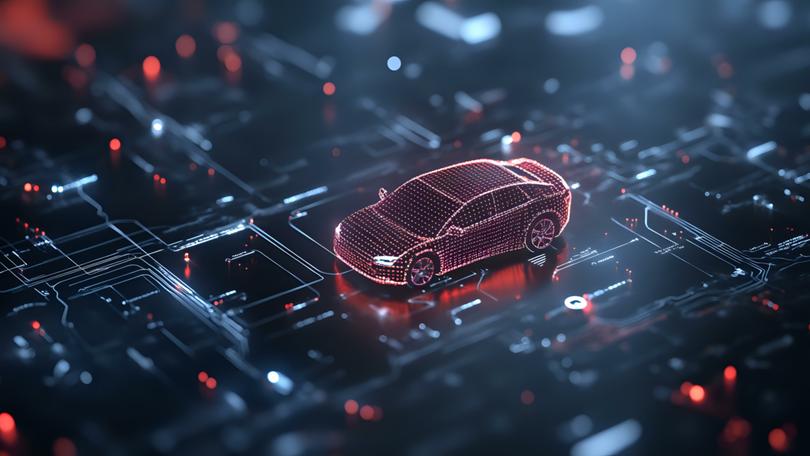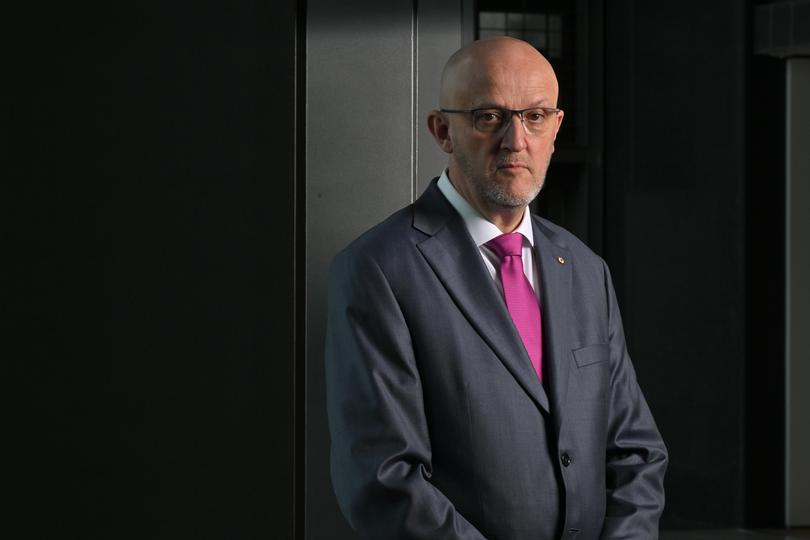ASIO chief had ‘conversation’ with Home Minister Tony Burke about Chinese EV risks
Intelligence chief Mike Burgess confirmed on Tuesday he had a “conversation” with Home Minister Tony Burke about his Chinese electric vehicle under Coalition questioning.

Intelligence chief Mike Burgess confirmed on Tuesday he had a “conversation” with Home Minister Tony Burke about his car under Coalition questioning about the national security implications of driving a Chinese electric vehicle.
Coalition home affairs spokesman Senator James Paterson has pressed the Government for answers this week on whether Mr Burke currently drives a Chinese-made electric car and what security countermeasures have been taken given the sensitive nature of his Home Affairs portfolio.
Security experts have increasingly issued warnings about the possible dangers posed by Chinese-made EVs and “connected vehicles” more generally, flagging their potential to act as listening and surveillance devices, as well as record sensitive information including GPS data.
Sign up to The Nightly's newsletters.
Get the first look at the digital newspaper, curated daily stories and breaking headlines delivered to your inbox.
By continuing you agree to our Terms and Privacy Policy.Asked about the issue during senate estimates in the legal and constitutional affairs committee, Mr Burgess confirmed he had advised Mr Burke on mitigations but declined to give specific details.
Speaking in the generic sense, “regardless of the manufacture of the car or the country of origin,” classified information should only be discussed in “appropriate secure locations” and not in front of any kind of microphone, he said.
“When it comes to electronic vehicles, it means everything you say may be recorded,” said Mr Burgess, adding this did not just apply to Chinese cars.
With car play or Android connect apps, “everyone you’ve called, everyone you’ve messaged, it’s all in there in the memory, and would be open to someone else who had access to that computer in the car. So just exercise caution and be aware of that and mindful of that,” he warned.
The ASIO chief acknowledged there were different classes of risk based on country of origin and technology.
During an earlier round of questioning in the committee on Monday, Home Affairs officials indicated they had given oral advice on a “range of mitigations” to the minister, principally that work-issued devices should not be plugged into connected vehicles.
But they indicated that he had not been specifically advised on whether he could connect a personal phone or drive the car to secure facilities.
Senator Paterson asked Mr Burgess if he could offer a view on “whether it’s a good idea to connect your personal device to a vehicle like that?”
He responded that it was a “risk management” decision individuals must take based on whether any sensitive or deeply private information was on their phones.

He confirmed that foreign intelligence agencies were not only interested in classified information but also in a range of more personal details about their target, including the inner workings of political parties.
There could be a risk of eavesdropping in an EV, “but I can tell you, the Minister is very aware of that and knows how to manage it effectively from my point of view,” he said.
Senator Paterson had returned to the issue in the Senate’s estimates this week after first raising concerns last November.
Fears about the risks of EVs come as the US prepares for a sweeping ban on key Chinese software and hardware in connected vehicles on American roads in stages starting from 2027, citing national security threats.
During Monday’s hearing, Mr Paterson demanded details on the Home Minister’s car from Labor Employment Minister Murray Watt who declined to reveal what type of vehicle his Cabinet colleague was driving.
The Home Minister “takes the position that he shouldn’t and does not discuss sensitive matters in any car,” he said.
“Wouldn’t it be safer if he didn’t drive a potential listening advice around?” quipped Mr Paterson.
No answer was offered.
The Nightly approached the Home Minister’s office for comment and spoke to three independent cyber security experts.
All agreed that more action had to be taken to address the growing security risks posed by connected vehicles.
“Chinese smart vehicles are equipped with hundreds or even thousands of sensors that collect real-time information on vehicle status, road conditions, and passenger behaviour. This data is often sent directly to Beijing,” said Tilla Hoja, an analyst with the Australian Strategic Policy Institute (ASPI).
The vehicle systems were connected to Chinese clouds to which they transmit data, added Mr Hoja.
“This clearly poses national security risks. It’s difficult to see how a federal minister can use a Chinese-made smart car without incurring these risks.”
Mobile apps or personal devices linked to those China-made EVs technically connected to China’s “smart city” platforms via cloud computing systems, allowing the misuse of data in ways that could expose personal privacy and sensitive information for exploitation, he added.
Dr Miah Hammond-Errey, CEO of Strat Futures and an adjunct Associate Professor at Deakin University said the national security risks for a high-profile figure using a Chinese EV or any connected vehicle were “real.”
“Chinese EVs– just like the western advertising industry and data economy–enables whoever purchases or accesses data to track, target and surveil individuals, including our political, defence and national security leaders,” she said.
High profile individuals be “particularly mindful about the level of data collection and surveillance in all environments, including in Chinese owned or manufactured vehicles,” she added.
In terms of mitigation, Australia should boost legislation to improve privacy protections and develop a whole of government mechanism to assess security risks in software, hardware and their supply chain proliferate.
Unlike Mr Hoja, Dr Hammond-Errey did not advocate US-style outright bans of specific technology from particular countries without a “well-evidenced threat,” arguing it would be better to regulate the dangers.
Dr Dennis Desmond, a cyber security expert from the University of the Sunshine Coast, called for a more robust evaluation of the “tempest” emanations, or electronic signals, emitted from EVs, that could be rich ground for intelligence agencies.
“Australia has placed itself in a difficult position by not having domestic vehicle production, especially for its political figures,” he said.
“You would have to assume that any vehicle used by any member of the government, whether shadow or current, has gone through a rigorous evaluation and a rigorous Tempest shielding,” he added.
Australia “needs to devote a lot more resources to looking at the technology threats that these vehicles represent.”

